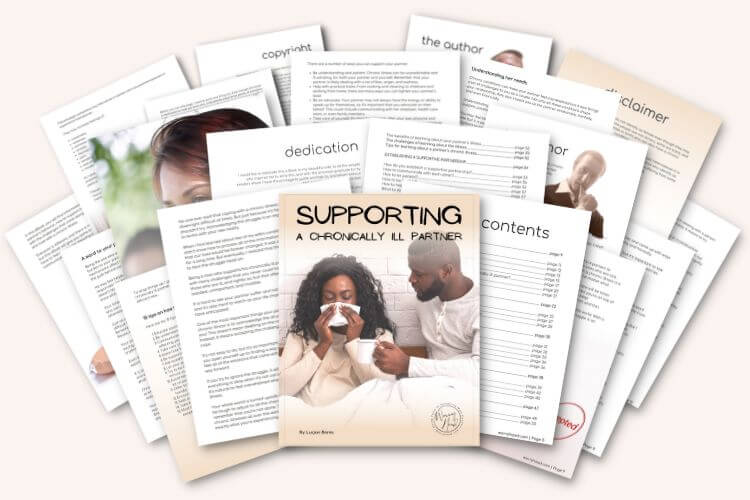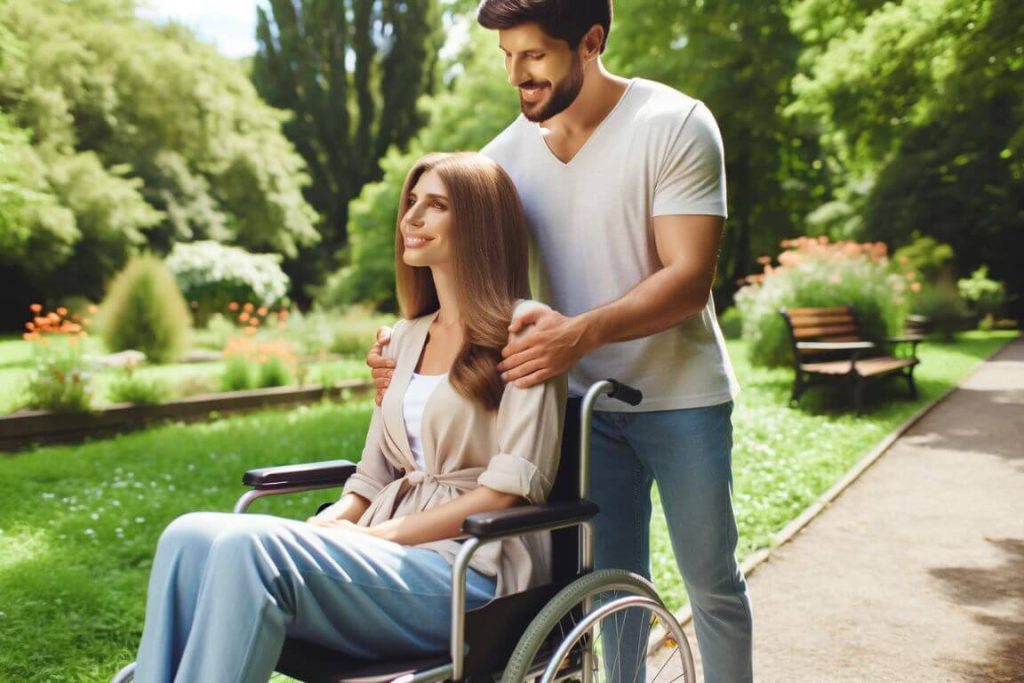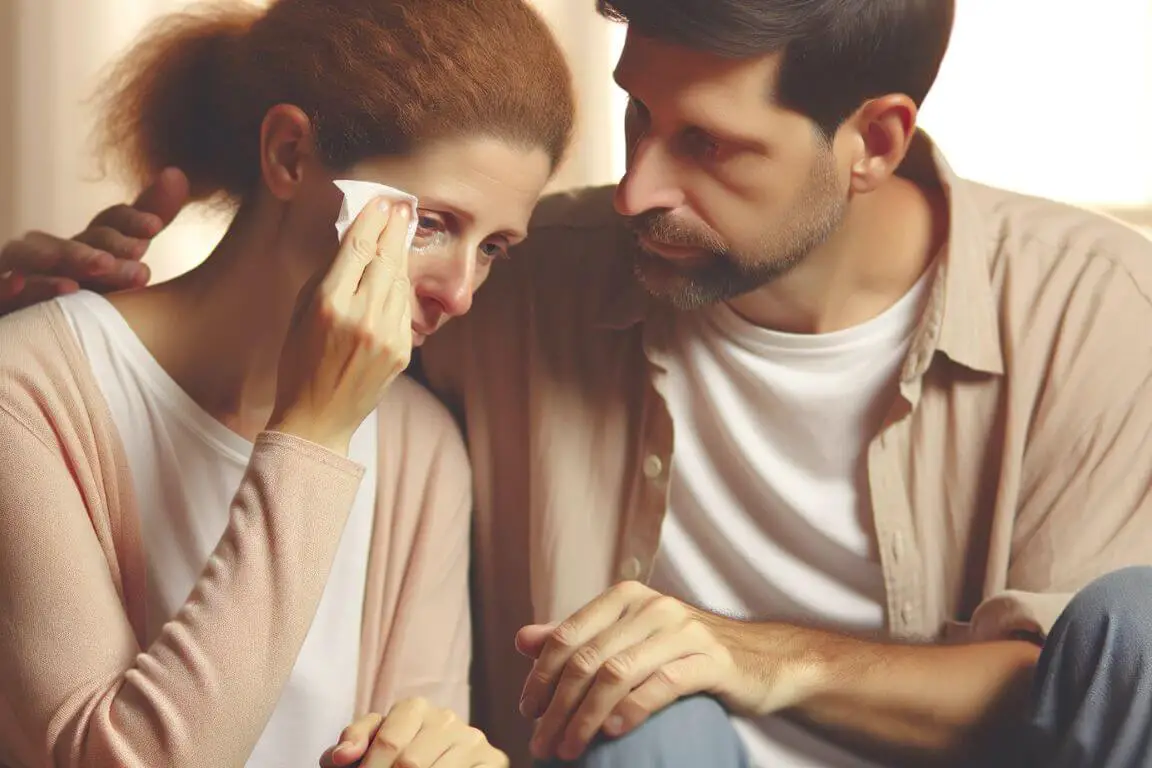How to Cope with a Chronically Ill Partner’s Emotions?
Just like you, I wondered once, how to cope with a chronically ill partner’s emotions if you feel the need to put that person first.
Coping with a chronically ill partner’s emotions requires empathy, patience, and open communication. Support them in seeking professional help when needed, maintain a positive attitude, and ensure self-care to manage your own emotions while providing a strong and understanding presence in their life.
This blog was born from love, empathy, and my desire to make a difference. I intended for partners of chronically ill women, but over time, I discovered that nearly 90% of my visitors are women who seek guidance on being supported by their loved ones. In this journey, I’ll share my experiences and insights.
Before starting this blog, I pursued a career in medicine, dedicating five years to medical school and working as a paramedic, but I transitioned to caring for disabled kids, driven by a deep-rooted passion for helping others. Meeting my partner, M, added new meaning to this mission.
My wife’s story revealed the challenges she faced, igniting my determination to advocate for women’s fair treatment.
As I watched her battle severe depression and later receive diagnoses of stage IV deep infiltrating endometriosis and fibromyalgia, I felt compelled to share our journey. M occasionally contributes her perspective to this blog, offering a unique touch to our shared experiences. Join us in navigating the complexities of supporting a chronically ill partner’s emotions.
- How to Cope with a Chronically Ill Partner's Emotions?
- How Men Respond to Their Partner's Diagnosis of Chronic Illness?
- How to React to Your Partner's Diagnosis of a Chronic Illness?
- What do Chronically Ill Women Feel?
- How to React to Chronically Ill Woman's Feelings?
- Financial Challenges of the New Normal
- How Blogging Can Help to Cope?
- Conclusion on How to Cope with a Chronically Ill Partner's Emotions
How to Cope with a Chronically Ill Partner’s Emotions?
Caring for my wife as she battles chronic illness has been a journey filled with love, challenges, and growth. In this guide, I want to share my experiences and insights on how to navigate the emotional rollercoaster that often accompanies being a caregiver to a chronically ill partner.
From the very beginning, I realized that my role as a caregiver extended far beyond just tending to her physical needs. It meant being a pillar of strength, understanding, and support during those moments when she faced overwhelming emotions.
Through the years, I’ve learned that empathy is our greatest ally. I’ve come to understand the depth of pain and frustration that my wife endures daily, and I’ve witnessed the strength it takes to persevere. While I may never fully comprehend her experience, I can always offer my heartfelt compassion and reassurance.
In this guide, I’ll share the strategies and lessons I’ve picked up along the way.
Together, we’ll explore the importance of open communication, the value of seeking professional help when needed, and the crucial role of self-care for caregivers. I hope that this guide will provide a source of inspiration and guidance to those who, like me, find themselves in the noble role of caring for a chronically ill partner.
If you want more in-depth information about how to support your partner with her chronic conditions and how to cope with the new normal in your relationship, I wrote a “Supporting a Chronically Ill Partner” e-Book.
You can get the 1st Chapter of the e-Book for FREE, and if you like it, you’ll get a Whopping 33% Discount on the Whole Book, plus discounts on other helpful tools. You have nothing to lose but a lot to gain!
The first chapter alone contains a lot of information for both of you about acknowledging the struggles, including:
- A word to your partner.
- A word to you.
- Stepping on eggshells.
- Understanding her needs.
- How to acknowledge having a chronically ill partner?
- Acknowledging can be hard.
- 15 tips on how to do it!
Get the 1st Chapter FREE!
Chronic Illness for Partners

How Men Respond to Their Partner’s Diagnosis of Chronic Illness?
When you first discover that your partner has a chronic illness can trigger a range of emotions. In men, often influenced by their personalities and coping mechanisms, there are some common reactions:
- Shock and disbelief: Initially, many men may feel a sense of shock or disbelief. Chronic illnesses often disrupt the status quo of a relationship, and it can take time to process the reality of the situation.
- Concern and empathy: Compassionate men often respond with genuine concern and empathy. They may want to understand the condition better, ask questions, and offer emotional support right from the start.
- Anxiety and fear: It’s natural for some men to experience anxiety and fear about the future. Worries about the impact of the illness on their partner’s health, the relationship, and their own ability to provide care can be overwhelming.
- Research and education: Many men take a proactive approach by researching chronic illness and seeking information. They may want to be well-informed to better support their partner and make informed decisions together.
- Adjustment and adaptation: Over time, men often adapt to the new reality. They may find ways to adjust their daily routines and responsibilities to accommodate their partner’s needs.
- Feelings of helplessness: Some men may struggle with feelings of helplessness, especially when they can’t directly alleviate their partner’s pain or symptoms. This can lead to frustration or sadness.
- Seeking emotional support: Men may turn to friends, family, or support groups to share their feelings and seek advice. Finding a community of caregivers can provide invaluable emotional support.
- Commitment and love: Ultimately, many men reaffirm their commitment and love for their partner. They become dedicated caregivers, offering unwavering support and understanding.
How to React to Your Partner’s Diagnosis of a Chronic Illness?
It’s important to remember that everyone’s response is unique, and there’s no right or wrong way to react. What matters most is the willingness to communicate openly with your partner, seek help when needed, and provide the emotional support they require during their journey with chronic illness.
In the next sections, I am going to give tips on how to respond and cope with these common reactions, including:
- Shock and disbelief
- Concern and empathy
- Anxiety and fear
- Research and education
- Adjustment and adaptation
- Feelings of helplessness
- Seeking emotional support
- Commitment and love

Shock and Disbelief
When men first learn about their partner’s chronic illness, it’s common to experience a sense of shock and disbelief. The news can be unexpected and challenging to process, as it often disrupts the familiar dynamics of the relationship. This initial reaction may manifest as denial, where the reality of the illness doesn’t immediately sink in.
Overcoming shock and disbelief requires time and patience. It’s essential to acknowledge these feelings and give yourself permission to grieve for the life you envisioned without the illness.
Open communication with your partner can help you understand the situation better and work through these initial emotions together. Seeking support from friends, family, or a therapist can also be beneficial in navigating this emotional hurdle.
Remember, it’s normal to have these initial reactions, and they don’t diminish your ability to provide meaningful support and care to your partner.
Concern and Empathy
Upon learning about their partner’s chronic illness, compassionate men often respond with genuine concern and empathy. They immediately recognize the pain and challenges their loved one is facing and want to be there to provide comfort and support.
Expressing concern and empathy is a powerful way to strengthen the bond between partners during such a difficult time. It involves actively listening to your partner’s feelings and experiences, offering a shoulder to lean on, and reassuring them that you’re in this together.
Showing empathy means trying to understand what your partner is going through from their perspective, even if you can’t fully comprehend the extent of their pain.
By demonstrating concern and empathy, men can create a safe and nurturing environment in which their partner feels valued and understood. This emotional support can be just as important as any physical care when it comes to coping with chronic illness.
Anxiety and Fear
Discovering your partner’s chronic illness can trigger anxiety and fear about the future. Concerns about how the illness will impact your partner’s health, the stability of the relationship, and your own ability to provide adequate care can be overwhelming.
It’s important to acknowledge these anxieties and fears rather than suppressing them. By recognizing your concerns, you can begin to address them constructively. This may involve seeking information about the illness, its treatment options, and how to manage it as a couple. Open and honest communication with your partner is crucial in alleviating anxieties and fears.
Sharing your worries and discussing your collective approach to tackling the challenges ahead can provide reassurance and clarity.
Additionally, self-care is essential for managing anxiety and fear. Taking time to prioritize your own emotional well-being through relaxation techniques, exercise, or seeking support from a therapist can equip you to better support your partner and navigate the journey together.
Research and Education
Many men take a proactive approach by researching their partner’s chronic illness and seeking education on the subject. This response stems from a genuine desire to understand the condition better and be well-informed caregivers.
Engaging in research and education is a commendable way to support your partner effectively. It allows you to ask informed questions during medical appointments, advocate for their needs, and make well-thought-out decisions together. It can also reduce feelings of helplessness by providing a sense of control through knowledge.
However, it’s essential to strike a balance between research and emotional support. While gaining knowledge is valuable, it’s equally crucial to be emotionally present for your partner. Strive to maintain open communication, listen to their feelings, and offer reassurance alongside your research efforts.

Adjustment and Adaptation
Over time, many men find ways to adjust their daily routines and adapt to the new reality of living with a chronically ill partner. This adjustment can involve changes in household responsibilities, work schedules, and social activities to accommodate their partner’s needs.
Adaptation is a testament to the resilience and commitment of caregivers. It reflects a willingness to evolve and find creative solutions to challenges as they arise. It may also involve seeking external support, such as home healthcare or assistance from friends and family, to share the caregiving load.
It’s important to approach adjustment and adaptation as a collaborative effort with your partner. Discussing and planning these changes together can ensure that both of your needs are met, and the relationship remains strong despite the challenges.
Feelings of Helplessness
Some men may struggle with feelings of helplessness when they can’t directly alleviate their partner’s pain or symptoms. Witnessing a loved one’s suffering without a clear solution can be deeply distressing.
It’s crucial to remember that you can’t always “fix” the situation, and that’s okay. What you can offer is emotional support, a listening ear, and a loving presence. Encourage your partner to communicate their needs, whether it’s physical assistance, a comforting hug, or simply someone to talk to.
Feelings of helplessness are a natural response, but they can be managed through self-care and seeking support when needed. By taking care of your own emotional well-being, you’ll be better equipped to provide the support your partner needs without feeling overwhelmed.
Seeking Emotional Support
Many men turn to friends, family, or support groups to share their feelings and seek advice when they learn about their partner’s chronic illness. Seeking emotional support from others who have experienced similar situations can provide valuable insights and a sense of camaraderie.
Sharing your thoughts and emotions with trusted individuals can be therapeutic. It allows you to vent, receive guidance, and gain perspective on your caregiving journey. Support groups, both in-person and online, offer a safe space to connect with others facing similar challenges.
Remember that seeking emotional support is not a sign of weakness but rather a sign of strength. It demonstrates your commitment to being the best caregiver you can be by taking care of your own emotional well-being.
Commitment and Love
Ultimately, many men reaffirm their commitment and love for their partner when faced with chronic illness. They become dedicated caregivers, offering unwavering support and understanding.
This commitment is a testament to the strength of the relationship and the depth of love between partners. It involves weathering the storms together, celebrating the small victories, and continuing to nurture the emotional connection.
Expressing love through words and actions, such as acts of kindness and gestures of affection, can be a powerful source of emotional support for your partner. Your unwavering commitment and love can provide a sense of stability and security during a challenging time.
Men’s reactions to learning about their partner’s chronic illness can vary, but each response is valid. By acknowledging and addressing these emotions and taking a proactive and compassionate approach, men can provide invaluable support to their partners on their journey of living with chronic illness.
What do Chronically Ill Women Feel?
Chronically ill women often experience a wide range of emotions. From my perspective as a caregiver to my chronically ill wife, I’ve witnessed the complexity of these feelings. They can include:
- Pain and Discomfort: Chronic illnesses typically come with physical pain and discomfort, which can lead to frustration and exhaustion.
- Frustration and Helplessness: Dealing with ongoing health challenges can be frustrating, especially when it feels like there’s no end in sight. This frustration can lead to moments of helplessness.
- Anxiety and Uncertainty: The unpredictability of chronic conditions can cause anxiety and uncertainty about the future, including concerns about treatment effectiveness and quality of life.
- Depression and Isolation: Prolonged illness can contribute to feelings of sadness and isolation, as women may be unable to engage in social activities or pursue their interests.
- Guilt and Burden: Many women with chronic illnesses may feel guilty about the impact of their condition on their partners and loved ones, often perceiving themselves as a burden.
- Resilience and Determination: Despite the challenges, chronically ill women often display remarkable resilience and determination to manage their condition and live their lives as fully as possible.
- Hope and Gratitude: There are moments of hope and gratitude for the support and love they receive from their partners and caregivers, like myself, who are there to cope with a chronically ill partner’s emotions.

How to React to Chronically Ill Woman’s Feelings?
Understanding and acknowledging your partner’s emotions is crucial in providing her meaningful support and being a source of strength and compassion for your chronically ill loved one.
In the next sections, I am going to give tips on how to respond and cope with her common feelings, including:
- Pain and discomfort
- Frustration and helplessness
- Anxiety and uncertainty
- Depression and isolation
- Guilt and burden
- Resilience and determination
- Hope and gratitude
Pain and Discomfort
When your chronically ill partner is in pain and discomfort, it can be challenging to witness. It’s crucial to understand that while you can’t eliminate their pain entirely, your presence and empathy can make a significant difference.
Be attentive to their needs, offer pain relief solutions as advised by their healthcare team, and provide emotional support. Simple gestures like holding their hand or preparing a warm compress can help alleviate some discomfort. Remember, your support can provide comfort even in the face of pain.
Frustration and Helplessness
Feelings of frustration and helplessness are common for both you and your partner. It’s essential to communicate openly about these emotions. Share your concerns with your partner, and encourage them to express their feelings too.
Together, you can find ways to cope with a chronically ill partner’s emotions and navigate the challenges. Seek support from therapists or support groups to learn effective coping strategies. Remember that you’re not alone in feeling this way, and there are resources available to help both you and your partner.
Anxiety and Uncertainty
Anxiety and uncertainty often accompany chronic illness. To cope with a chronically ill partner’s emotions, maintain open communication. Discuss your partner’s fears and anxieties, and reassure them of your commitment and love. Together, explore treatment options and create a plan for managing the condition.
Educate yourself about the illness to reduce uncertainty and be prepared for potential challenges. Seek therapy or counseling if needed to manage anxiety and provide emotional support.

Depression and Isolation
Chronic illness can lead to depression and isolation. Encourage your partner to seek professional help if they are experiencing depressive symptoms. Support their efforts to connect with friends and family, even if it’s through virtual means.
Plan activities that you can do together from the comfort of your home to combat isolation. Remind your partner that you’re there for them, and your love is a powerful source of emotional support.
Guilt and Burden
Your partner may feel guilty about the impact of their illness on you. Reassure them that you’ve made a choice to stand by their side and that their condition doesn’t change your love and commitment.
Encourage open conversations about their feelings of guilt, and remind them that you’re a team, sharing both the burdens and joys of life. Seek couples therapy if necessary to navigate these emotions together and find healthy ways to cope with a chronically ill partner’s emotions.
Resilience and Determination
Acknowledge and celebrate your partner’s resilience and determination in the face of chronic illness. Express your admiration for their strength and perseverance. Be a source of motivation and encouragement, reminding them that you believe in their ability to overcome challenges.
Support their treatment plans and be a dependable partner in their journey toward better health.
Hope and Gratitude
Foster hope and gratitude within your relationship. Share moments of hope when you see improvements in your partner’s condition or when you find joy in everyday life together. Express gratitude for the love and support you both provide. Celebrate milestones and cherish the positive aspects of your relationship.
Cultivate a sense of optimism that can uplift both you and your partner as you cope with a chronically ill partner’s emotions.
In navigating these emotions, remember that it’s okay to seek professional help for both yourself and your partner. Therapists and support groups can provide valuable guidance and a safe space to address these feelings and strengthen your relationship.
Financial Challenges of the New Normal
Navigating the financial challenges of the “new normal” while also coping with a chronically ill partner’s emotions can be a daunting task, but it’s one that many of us face. Here’s some guidance for my fellow men on how to tackle these challenges head-on.
First and foremost, communication is key! Sit down with your partner and have an open, honest conversation about your financial situation.
Discuss any changes in income or expenses due to the new normal, such as job loss or increased healthcare costs. By sharing your concerns and working together on a budget, you can create a financial plan that aligns with your current circumstances.
Next, prioritize financial stability. Look for ways to cut unnecessary expenses and save for unexpected costs that may arise. Building an emergency fund can provide peace of mind during uncertain times. Explore financial assistance programs or community resources that may be available to support families facing chronic illness-related expenses.
Seek professional advice if needed. Consider consulting a financial advisor who can help you navigate complex financial decisions. They can guide investment strategies, insurance options, and long-term financial planning to secure your family’s future.
Remember that coping with a chronically ill partner’s emotions also requires emotional support. Be understanding and empathetic, and encourage your partner to seek professional help if their emotional challenges become overwhelming.
In conclusion, the new normal may bring financial challenges, but with open communication, prioritization of financial stability, and professional guidance, you can navigate these obstacles while providing the emotional support needed to cope with a chronically ill partner’s emotions. Together, you can face these challenges and emerge stronger as a couple.

How Blogging Can Help to Cope?
Blogging provides a platform to express my feelings and experiences. It allows me to share the highs and lows of caregiving, offering a release for pent-up emotions. By openly discussing the challenges, I can find solace in knowing that others may relate to my journey.
Through blogging, I can connect with others who are also caregivers or have partners with chronic illnesses. It creates a supportive online community where I can exchange advice, stories, and words of encouragement. Building these connections can be invaluable in navigating this challenging role.
Blogging allows me to raise awareness about the specific conditions my partner faces, like endometriosis and fibromyalgia. By sharing educational content, I can contribute to a better understanding of these illnesses, both for myself and for others who may be dealing with similar situations.
Chronic illness journeys are filled with ups and downs.
Blogging serves as a record of our experiences, from doctor’s appointments to moments of triumph. It helps me track progress, identify patterns, and celebrate small victories, which can be crucial in maintaining a positive outlook.
Through my blog, I can become an advocate for my partner and others living with chronic illnesses.
By sharing my story and advocating for better healthcare and support systems, I can contribute to positive change in the healthcare community. But blogging also encourages self-reflection and self-care. It allows me to step back, assess my own well-being, and share tips and strategies for maintaining my emotional and mental health as a caregiver.
In essence, blogging provides an outlet for expression, a support network, and a means of education and advocacy. It not only helps me cope with the challenges of caregiving but also offers a platform to inspire and connect with others on similar journeys.
There are two major ways that blogging can help you cope with your chronically ill partner’s emotions, but also your wallet!
I give a massive amount of information on another of my blogs where you will find in-depth information. In the next sections, I will touch upon two of them:
- Blogging as a therapeutic outlet.
- The benefits of blogging over a traditional job.
Blogging as a Therapeutic Outlet
Blogging has proven to be an incredible therapeutic outlet for me as I cope with the emotional challenges of caring for my chronically ill partner. Here’s how it has helped:
Blogging allows me to pour my thoughts and emotions onto a digital canvas. It’s a safe space where I can openly express my feelings, fears, and frustrations. This act of writing is cathartic, helping me process my emotions and gain clarity about my own experiences as a caregiver.
Moreover, sharing my journey with others who may be in similar situations fosters a sense of community and support. I’ve found solace in connecting with fellow caregivers and individuals who face similar challenges in their lives. This sense of belonging is invaluable when coping with a chronically ill partner’s emotions.
Blogging also offers a sense of accomplishment. Each blog post represents a step forward, a moment of reflection, and a contribution to a growing body of knowledge about caregiving. It gives me purpose and allows me to advocate for the well-being of my partner and others in similar circumstances.

The Benefits of Blogging over a Traditional Job
Opting for blogging over a traditional job while caring for a chronically ill partner has its unique advantages. Here’s how it can be a beneficial choice:
- Flexibility: Blogging allows me to set my own schedule. I can adjust my work hours to accommodate my partner’s medical appointments and needs. This flexibility is invaluable when caring for someone with a chronic illness.
- Work-Life Balance: Traditional jobs often demand long hours and rigid schedules. Blogging allows me to prioritize my partner’s well-being without compromising my career. It helps me maintain a healthier work-life balance.
- Emotional Support: Blogging connects me with a community of caregivers and individuals who share similar experiences. This built-in support network is essential when coping with a chronically ill partner’s emotions. Traditional jobs may lack this level of emotional support.
- Advocacy: Through blogging, I can become an advocate for chronic illness awareness and support. I have the freedom to raise awareness and share our journey, potentially inspiring others to seek help and understanding.
- Self-Care: Blogging encourages self-reflection and self-care. It allows me to prioritize my emotional and mental well-being, which is crucial when caring for a loved one with a chronic illness.
While blogging may not offer the financial stability of a traditional job, it provides a range of benefits that align with the unique demands of caregiving. It allows me to balance my responsibilities as a caregiver while still pursuing meaningful work and advocacy.
Conclusion on How to Cope with a Chronically Ill Partner’s Emotions
In conclusion, blogging has proven to be a therapeutic outlet like no other for me, a caregiver navigating the challenges of supporting my chronically ill partner. It has provided a space to express my emotions, connect with a supportive community, and advocate for awareness and understanding of chronic illnesses.
Choosing to blog over a traditional job has also offered me the flexibility to balance my caregiving responsibilities and self-care effectively.
To my fellow men who find themselves in a similar role, I want to offer a word of encouragement. Caring for a chronically ill partner can be emotionally taxing, but know that you are not alone.
Through blogging or other creative outlets, you can find a source of relief, share your experiences, and connect with a community that understands your journey. Embrace the flexibility and emotional support that blogging can provide, and remember to prioritize your own well-being as you care for your loved one.
I invite you to share your thoughts, experiences, or questions in the comments below. Let’s foster a supportive space where we can learn from each other’s journeys and offer guidance to fellow caregivers. Your insights and stories can be a source of strength and encouragement to others facing similar challenges.


About Me
Hi, I’m Lucjan! The reason why I decided to create this blog was my beautiful wife, who experienced a lot of pain in life, but also the lack of information about endometriosis and fibromyalgia for men…
